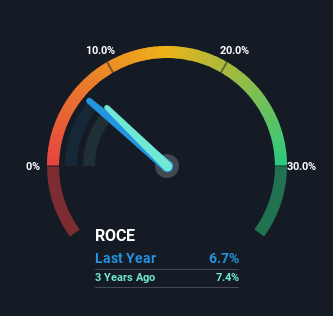- Hong Kong
- /
- Gas Utilities
- /
- SEHK:3
Returns On Capital At Hong Kong and China Gas (HKG:3) Have Hit The Brakes
If you're not sure where to start when looking for the next multi-bagger, there are a few key trends you should keep an eye out for. One common approach is to try and find a company with returns on capital employed (ROCE) that are increasing, in conjunction with a growing amount of capital employed. Basically this means that a company has profitable initiatives that it can continue to reinvest in, which is a trait of a compounding machine. Although, when we looked at Hong Kong and China Gas (HKG:3), it didn't seem to tick all of these boxes.
What Is Return On Capital Employed (ROCE)?
For those that aren't sure what ROCE is, it measures the amount of pre-tax profits a company can generate from the capital employed in its business. To calculate this metric for Hong Kong and China Gas, this is the formula:
Return on Capital Employed = Earnings Before Interest and Tax (EBIT) ÷ (Total Assets - Current Liabilities)
0.067 = HK$7.7b ÷ (HK$160b - HK$44b) (Based on the trailing twelve months to June 2024).
Therefore, Hong Kong and China Gas has an ROCE of 6.7%. In absolute terms, that's a low return and it also under-performs the Gas Utilities industry average of 8.6%.
Check out our latest analysis for Hong Kong and China Gas

Above you can see how the current ROCE for Hong Kong and China Gas compares to its prior returns on capital, but there's only so much you can tell from the past. If you're interested, you can view the analysts predictions in our free analyst report for Hong Kong and China Gas .
What The Trend Of ROCE Can Tell Us
There hasn't been much to report for Hong Kong and China Gas' returns and its level of capital employed because both metrics have been steady for the past five years. Businesses with these traits tend to be mature and steady operations because they're past the growth phase. With that in mind, unless investment picks up again in the future, we wouldn't expect Hong Kong and China Gas to be a multi-bagger going forward. That probably explains why Hong Kong and China Gas has been paying out 90% of its earnings as dividends to shareholders. If the company is in fact lacking growth opportunities, that's one of the viable alternatives for the money.
The Bottom Line
In summary, Hong Kong and China Gas isn't compounding its earnings but is generating stable returns on the same amount of capital employed. Since the stock has declined 41% over the last five years, investors may not be too optimistic on this trend improving either. In any case, the stock doesn't have these traits of a multi-bagger discussed above, so if that's what you're looking for, we think you'd have more luck elsewhere.
One more thing to note, we've identified 2 warning signs with Hong Kong and China Gas and understanding these should be part of your investment process.
For those who like to invest in solid companies, check out this free list of companies with solid balance sheets and high returns on equity.
Valuation is complex, but we're here to simplify it.
Discover if Hong Kong and China Gas might be undervalued or overvalued with our detailed analysis, featuring fair value estimates, potential risks, dividends, insider trades, and its financial condition.
Access Free AnalysisHave feedback on this article? Concerned about the content? Get in touch with us directly. Alternatively, email editorial-team (at) simplywallst.com.
This article by Simply Wall St is general in nature. We provide commentary based on historical data and analyst forecasts only using an unbiased methodology and our articles are not intended to be financial advice. It does not constitute a recommendation to buy or sell any stock, and does not take account of your objectives, or your financial situation. We aim to bring you long-term focused analysis driven by fundamental data. Note that our analysis may not factor in the latest price-sensitive company announcements or qualitative material. Simply Wall St has no position in any stocks mentioned.
About SEHK:3
Hong Kong and China Gas
Produces, distributes, and markets gas, water supply and energy services in Hong Kong and Mainland China.
Proven track record second-rate dividend payer.
Similar Companies
Market Insights
Community Narratives


Recently Updated Narratives


MINISO's fair value is projected at 26.69 with an anticipated PE ratio shift of 20x


The Quiet Giant That Became AI’s Power Grid


Nova Ljubljanska Banka d.d will expect a 11.2% revenue boost driving future growth
Popular Narratives


The company that turned a verb into a global necessity and basically runs the modern internet, digital ads, smartphones, maps, and AI.


MicroVision will explode future revenue by 380.37% with a vision towards success



